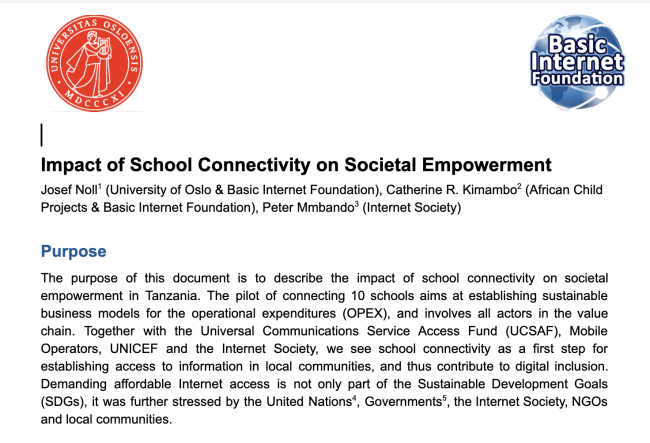BasicInternet:IEEE Reg8-BasicInternet Intro Jul2020
From its-wiki.no
| IEEE Reg8-BasicInternet Intro Jul2020 | |||||||
|---|---|---|---|---|---|---|---|
|
BasicInternet:IEEE Reg8-BasicInternet Intro Jul2020
| Title | BasicInternet:IEEE_Reg8-BasicInternet_Intro_Jul2020 |
|---|---|
| Place | Zoom.us |
| Date, Time | 2020/07/21, 1100-1230 |
| Contact Person | Josef.Noll |
| Participants | Josef.Noll, Albert Lysko |
| related to Project | BasicInternet |
| Keywords |
| this page was created by Special:FormEdit/Meeting, and can be edited by Special:FormEdit/Meeting/BasicInternet:IEEE Reg8-BasicInternet Intro Jul2020 |
| Category:Meeting |
Way ahead
Goal of the meeting was to elaborate on how IEEE Region 8 could support Digital Inclusion through e.g. the free access to information , aka Internet Lite. As IEEE is more on promoting standards, we are looking for standards supporting Internet Lite.
Thus, discussions focussed on
- state of innovation at Telecom operators
- National Wifi as means for digital inclusion
- Policies and regulations for digital inclusion
- Global platform economy and the impact on the national economy, e.g. from 59 million people in ZA only about 5 million people pay tax
- The National Knowledge Portal as contributor to digital inclusion
We agreed to focus on (1) information exchange and (2) the outlook for common projects, see BasicInternet:Ongoing#Projects
Topics being discussed
State of innovation at Telecom operators. We had a common opinion, that the current business model of operators does not favour connecting the unconnected, and that we need policies and regulations for digital inclusion. We were more specific about
- Lessons learned from Femto-cells: As long as every operator has it's own femto cells, the business models of micro operators or people providing connectivity will not work. We need regulations, e.g. 20 MHz as a common frequency for all femto/small cells.
- Extend the reach of mobile networks: Our main focus (see BasicInternet 1.0) was on access, providing information spots in areas with no mobile coverage. Thus, we focussed on directive antennas on masts, reaching mobile towers more than 20 km away (see DigI:Selela).
- One concern addressed was that Internet Lite is a duplication of information, thus will not be accepted in the market.
Our experience with the AMP standardis that it's as simple as using a plugin for Wordpress, and as such have both full web http://BasicInternet.org and lightweight web http://BasicInternet.org/amp/ version available.
- Another concern was that Internet Lite may be seen as underrated type of service. Our argumentation is that Information for all is such an entry service. And, yes, it does not cover broadband - but that's the basis of a freemium model.
National_Knowledge_Portal
See detailed discussion in BasicInternet 2.0
Media:202006IntegratedApproach_Noll_Sess7_WSummit.pdf Introduction_Unafundo(South_Africa)-_Basic_Internet_Foundation
BasicInternet - from access to empowerment
The Basic Internet Foundation ([BasicInternet.org]) has the vision to improve the life of every human through free access to information on the Internet. The BasicInternet Solution is two-fold; First, we reach out to areas where there is no Internet. Second, we provide Internet Lite, the freemium model for access.
- We have an open world policy, where all what is not declared confidential is open. Resulting in our open List of Meetings.
- As such, our Solutions for access are published on our wiki BasicInternet.no.
BasicInternet 1.0 - access
The distributed architecture opens for a quick deployment of a cost-effective Internet distribution worldwide, allowing for a reception of a 3G/4G network even in areas with no connectivity. Our examples have proven that we connect even in places without connectivity.
- In Selela, at the border of the Serengeti in Northern Tanzania, we reached the mobile tower being more than 20 km away. Typical 3G coverage is 7-9 km, thus we extended the reach by almost a factor of three.
- In Izazi in the Iringa district, we connected to the mobile network being hidden by the mountain ridge between Izazi and the mobile towers in Migoli. It took us 90 min to establish Internet access in Izazi.
- Together with communities we have activities in 9 countries, out of which 5 countries in Africa - see DigI:Villages
BasicInternet 2.0 - free access to the National Knowledge Portal
Through the Digital Inclusion (DigI) project we have seen a tremendeous knowledge uptake through digital local information spots providing Digital Health, see http://Yeboo.com (community information spot - focus on health)
Thus, BasicInternet 2.0 focusses on the National Knowledge Portal, incorporating all four aspects needed for empowerment in the digital society:
- Access - building Information Spots in villages/communities with free access to information
- Skills - establishing a National Knowledge Portal with information on health, education, agriculture, financial inclusion and more
- Regulations - having free access to the National Knowledge Portal as part of the licence conditions is straightforward
- Inclusion - providing the free access to information is a first step, having tailored information for minorities and people with disabilities is a common demand.
In Zimbabwe, we are working with ZIMCHE on establishing the Educational Knowledge Portal.
Special focus is on sustainability, and a solution that addresses OPEX costs as little as 15-20 USD/month for the connectivity. Please read more in our paper on Impact of school connectivity, the business model for "minimum connectivity"

